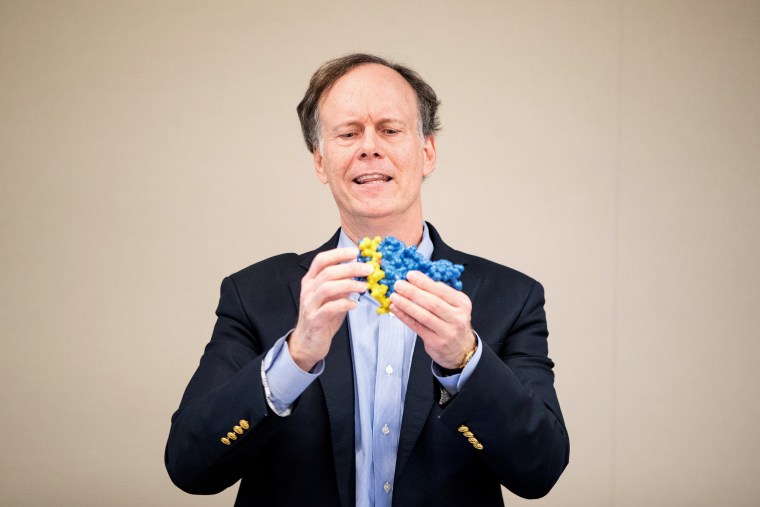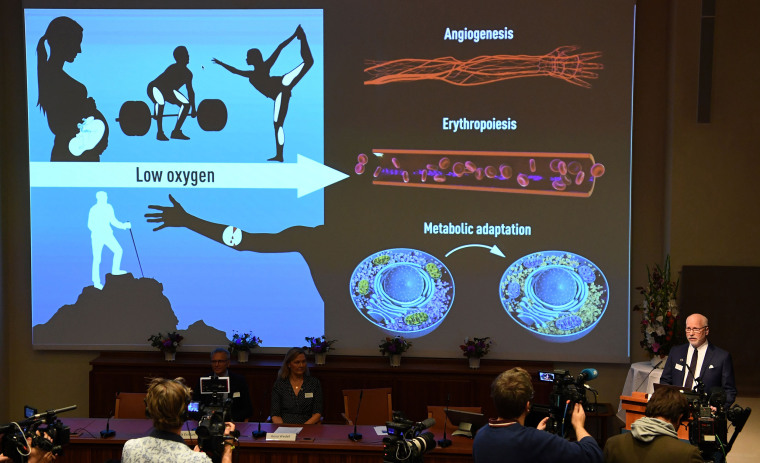The scientific discoveries that earned a trio of researchers the Nobel Prize in Physiology or Medicine on Monday are fueling the development of new treatments for potentially deadly conditions including cancer, heart attack and stroke.
Two Americans and a Briton will share the 9-million kronor ($918,000) prize for discoveries that provide a better understanding of the way the human body senses and adapts to varying levels of oxygen. Scientists have long known that oxygen is an essential ingredient for human life, but the discoveries provide new insights into the way our cells respond to changes in oxygen levels.
“This is about the process in our cells that allow them to sense oxygen and determine what to do depending on whether they are getting enough,” said Joan Massagué, director of the Sloan Kettering Institute in New York City. “When oxygen levels are too low, cells know that they have to take emergency measures to adapt their metabolism or adapt their behavior” — for example, making more red blood cells or generating new blood vessels, a process known as angiogenesis.

Experts say the discoveries were integral to the development of so-called angiogenesis blockers like Avastin (bevacizumab), which treat cancer by blocking tumor cells’ ability to trigger the growth of new blood vessels they need to obtain oxygen and nutrients.
Angiogenesis blockers are used to treat a variety of cancers, including malignancies of the brain, kidney, lung and colon. In many cases, the drugs are used in combination with other treatments, including chemotherapy.
“For cancer, a single bullet is not going to be enough — it requires combining various approaches,” Massagué said. “If we can suppress the ability of cancer cells to procure oxygen, it gives us another flank to attack cancer.”
The discoveries could help spur the development of new drugs for anemia, a blood disorder in which patients lack enough healthy red blood cells to carry oxygen to the organs. “It’s critically important for understanding what controls anemia at different levels,” said Janis Abkowitz, head of the division of hematology at the University of Washington School of Medicine in Seattle and the former president of the American Society of Hematology. “This has led a lot to the understanding of how oxygen is needed.”
The discoveries could also help lead to the development of new drugs for heart attack and stroke, said Matthew Vander Heiden, associate professor of biology and associate director at the Koch Institute for Integrative Cancer Research at MIT. Both conditions are marked by cell damage resulting from interruption of the delivery of oxygen-rich blood to critical tissues.
Heart attack and stroke are often thought of as “plumbing problems,” Vander Heiden said, referring to the blood vessel blockages or leaks that are the immediate cause of the conditions. “We know that we’ve got to fix the plumbing problem, but there may be more we can do to help the tissue actually recover” from the lack of oxygen.
Farther down the road, Vander Heiden added, the discoveries might lead to new treatments for spinal cord injury — for example, drugs that might promote regeneration of damaged nerve cells in the spine.
The Nobel Prize was awarded to William G. Kaelin Jr., a professor of medicine at Harvard Medical School in Boston; Peter J. Ratcliffe, director of clinical research at the Francis Crick Institute in London; and Gregg L. Semenza, a professor of genetic medicine at Johns Hopkins University of Medicine in Baltimore.
Want more stories about science?
- An island imperiled: As their home melts, Greenlanders confront the fallout of climate change
- Are we living in a simulated universe? Here's what scientists say.
- A massive raft of volcanic rock could be heading toward Australia. That could be good news.
Sign up for the MACH newsletter and follow NBC News MACH on Twitter and Facebook and Instagram.



